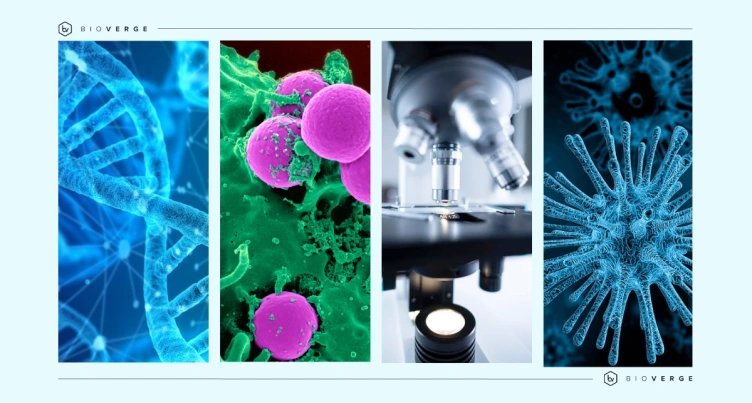One little girl opened my eyes to the awe-inspiring innovative possibilities emerging in healthcare and biotechnology.
Every day we’re seeing profound breakthroughs in biological research that are rapidly transforming our understanding of disease and the human body. Equally exciting are advancements in technology in computing and beyond. In biotech, the combination of these two developments are increasing the pace of innovation at an unparalleled pace.
Case in point: let me introduce you to Evie.
I first met Evie at the California Institute for Regenerative Medicine (CIRM). She was born without an immune system. Diagnosed with ADA-SCID shortly after birth, she was at constant risk of dying from viral, bacterial, and fungal infections.
In the past, kids born with this disease were known as “bubble babies.” They had to be kept in strict isolation until they could get a bone marrow transplant from a matching donor. Using funds from CIRM, a team at UCLA modified Evie’s own blood stem cells to correct the genetic mutation that caused ADA-SCID. Evie was cured, and she is now a thriving eleven year old.
To date, twenty-eight children just like Evie have been successfully treated and cured with the technology CIRM has funded. We’re living in a world where the accelerating pace of breakthroughs in biology and technology are increasing our collective lifespan, as well as our heathspan—those crucial healthy years of our life.
We’re in a new era of innovation.
One of the first milestones in biological research occurred in the mid-19th century, with the discovery of germ theory. This ‘Medicine 1.0’ breakthrough helped to control regular outbreaks of disease like cholera, dysentery, and typhoid. The results were profound: by 1900, the collective life expectancy in the United States increased to 48.2 years, a 22% increase over what it had been forty years prior.
Next, the end of World War II brought the beginnings of ‘Medicine 2.0’ with the creation of the randomized controlled trial (RCT), which became the gold standard of how clinical trials are conducted. Thanks in part to our newfound ability to test the effectiveness of new medications and approve them for mass consumption, by 1975, our collective life expectancy increased to 71.4 years, an increase of 48% in the span of merely 75 years.
Today, the United Nations estimates the average global life expectancy is 72.6 years, and in the United States life expectancy is 78.9 years. With each passing year, the newly born live about three months longer than those born the prior year.
We’re only beginning to scratch the surface of what’s possible.
For example, did you know that the “tech” in biotech has nothing to do with transistors or silicon?
In the early 1970s, two scientists, Herbert Boyer and Stanley Cohen, presented their research on a groundbreaking biological breakthrough at a conference in Hawaii: recombinant DNA. They found potential for collaboration over a series of late-night conversations. From there, they decided to start a new venture: Genentech.
They used this new technology—recombinant DNA—to get bacteria to produce human insulin. And in the process, they created a whole new industry.
Today, with new “Medicine 3.0” tools—genetic engineering and modification, cell and tissue engineering, AI-enabled drug discovery, digital health and remote monitoring, cellular profiling and biomarker identification, and genetic sequencing and pharmacogenomics, and more—we can now develop in days, weeks, or months highly-targeted and personalized therapies that previous generations couldn’t possibly create in a lifetime.
For example, the statistics around organ transplant are shocking. Seventeen people die everyday waiting for organ transplants, while nearly 60% of properly donated organs are wasted due to the short viability clock. For patients that do receive a transplant, many will deal with complications due to chronic rejection by their immune system.
What if patients no longer had to wait for a donor? One of Bioverge’s portfolio companies, Volumetric, is developing a viable path towards 3D printing replacement organs. In 2021, Volumetric was acquired by 3D Systems in a deal valued up to $400 million. Together, they are seeding lung scaffolds with stem cells and have already demonstrated gas exchange in animal models.
What if the organ was made from the patient’s own cells? Hepatx is working on turning fat stem cells into functioning liver cells, replacing the need for liver transplants with a virtually unlimited supply of donor cells.
Therapies can be custom fit to the patient as well. Excision is using CRISPR technology to cure viral infectious diseases and improve the lives of chronically ill patients. Aspen Neuroscience is leveraging an in-house stem cell biology and genomics platform to provide the world’s first autologous induced pluripotent stem cell (iPSC)-derived neuron replacement therapy for Parkinson’s Disease.
Another company, Enveda Biosciences, is using groundbreaking deep learning algorithms to turn drug discovery into a search query. Enveda’s platform allows them to rapidly probe our planet’s dark chemical space for new medicines, fundamentally changing where the industry looks for them, and the speed and scale at which we find them. They’ve effectively built a Google search for drug discovery.
Other companies in our portfolio are bringing new technology-enabled solutions to the American mental health crisis. Foresight Mental Health is transforming the current standard of care from qualitative (i.e. "how are you feeling today") to be data-driven, highly personalized, and objective. Alto Neuroscience is using AI-drived brain biomarkers to develop personalized and precise psychiatric therapeutics.
What if you could join this boundary-breaking research to push our collective healthspan even higher?
Here at Bioverge, we’re helping individuals diversify their portfolio with alternative assets for the purposes of long-term wealth generation, while also bringing to life the same types of technologies that cured Evie.
We’re investing in visionary entrepreneurs who are transforming healthcare and bringing science fiction to life.
Written by Neil Littman, Founder/CEO and General Partner at Bioverge Ventures
